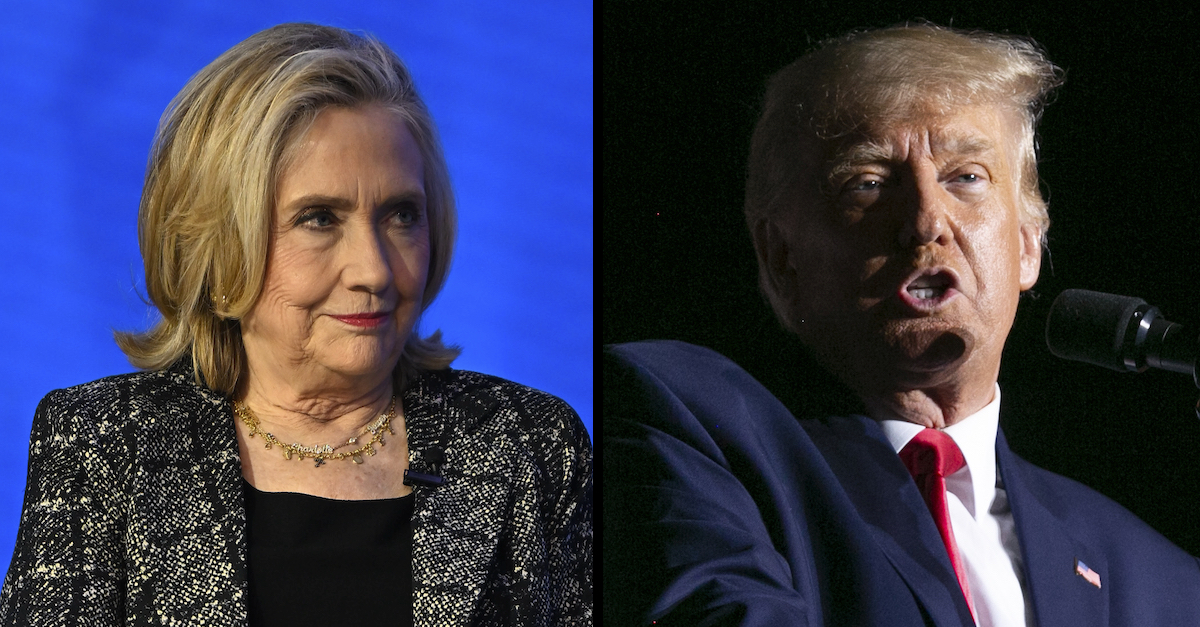
Hillary Clinton attended a Clinton Global Initiative meeting on Sept. 20, 2022 in New York City. Former President Donald Trump spoke at a rally on Sept. 23, 2022 in Wilmington, North Carolina.
Two weeks after a federal judge, for the second time, refused to step aside from Donald Trump’s “bad faith” racketeering (RICO) civil lawsuit against Hillary Clinton, the former president’s lawyers are asking a federal appellate court to step in.
A notice of appeal filed on Wednesday to the Trump v. Clinton docket shows that Trump lawyers Alina Habba, Michael T. Madaio, Peter Ticktin, and Jamie A. Sasson are adding two recent beatdowns by U.S. District Judge Donald Middlebrooks to their growing list of appealable issues.
The lawyers, who are already appealing the dismissal of the case and a $1 million sanctions award in the U.S. Court of Appeals for the 11th Circuit, are now appealing Middlebrooks’ second refusal to remove himself from overseeing the case and the judge’s denial of the Trump team’s motion for an indicative ruling.
The second refusal
On Sept. 15, Judge Middlebrooks, a Bill Clinton appointee who has said he’s “never met or spoken with Bill or Hillary Clinton” and has never had “any relationship with the Clintons,” wrote that Trump brought the appeal to the 11th Circuit back in February, divesting the district court and Middlebrooks of “control over those aspects of the case involved in the appeal.””
In explaining the jurisdictional issue, the judge pointed out that while Trump did seek and receive a stay of appeal in the 11th Circuit pending an indicative ruling in the district court, the former president did not seek a stay of appeal as to the motion to disqualify.
“He did not, however, file a motion to stay the appeal for a motion to disqualify,” the judge wrote. “Further, fourteen days have passed since he filed the motion to disqualify, and he has not filed a motion in the Eleventh Circuit to stay the appeal to allow me to rule on it. As a result of Plaintiff’s partial adherence with these rules, the Eleventh Circuit only stayed the appeal ‘pending Appellant seeking an indicative ruling below.’”
Middlebrooks said, however, that even if he did have jurisdiction he would still have denied the request to remove himself from the case.
“The case before me was frivolous, its purpose was improper and part of a pattern of behavior harmful to the Rule of Law,” he wrote. “Article III judges have an obligation to protect the administration of justice from abuse.”
The motion for an indicative ruling
Trump’s lawyers in July filed a motion for an indicative ruling, arguing that the Durham Report’s release “seismically alters the legal landscape of this case,” “corroborates many facts and allegations about which this Court expressed skepticism,” and “is enough to get President Trump past the motion to dismiss threshold and makes any award of sanctions inappropriate.”
Read Related Also: Texas forces killer drunk drivers to pay child support to victims
In short, the Trump team argued that Middlebrooks should find the Durham Report details were significant enough to vacate the orders he issued tossing the case and awarding sanctions.
The problem? Judge Middlebrooks on Sept. 15, the same day he denied the renewed disqualification bid, said the purported “newly discovered evidence” cited by the Trump team didn’t change the fact the initial RICO lawsuit was plainly filed in “bad faith” to exact “revenge” on Trump’s political foes over the Russia investigation.
“I imposed nearly $1 million in sanctions on Movants for filing, and doubling down on, a shotgun pleading that functioned as an abusive litigation tactic and was designed to further a political narrative. In doing so, I relied on three Eleventh Circuit decisions, with conduct less problematic than here, that affirmed an imposition of sanctions because of shotgun pleadings,” the judge wrote. “I explained that cases like this are harmful to the rule of law, portray judges as partisans, and divert resources that should be directed to real harms and legitimate legal claims.”
The judge further noted that he called out Trump’s lawyers for “consistently misrepresenting and cherry-picking portions of public reports and filings to support a false factual narrative” — and he provided examples:
To name only a few, Movants misrepresented the findings of the Special Counsel Robert Mueller’s Report, alleging, inter alia, that it “exonerate[d]” him. Yet in referring to obstruction of justice, the Mueller Report said “[w]hile this report does not conclude that the President committed a crime, it also does not exonerate him.” Similarly, Movants relied heavily on the DOJ Inspector General’s Report into the Crossfire Hurricane Investigation, without acknowledging its conclusion that the FBI opened the investigation “for an authorized purpose” and “with adequate factual predication” that had nothing to do with the Defendants or the Steele Dossier.
Middlebrooks went on to say that the Durham Report did nothing to change his mind about why this RICO suit was filed in the first place.
“Movants pursued this lawsuit in bad faith for the improper purpose of dishonestly advancing a political narrative. As I previously explained, Mr. Trump is a prolific and sophisticated litigant who is repeatedly using the courts to seek revenge on political adversaries,” the judge concluded. “This case is straight out of that playbook. Nothing in the Durham Report changes that.”
What happens next
After Middlebrooks denied both of their motions, Trump’s attorneys told the 11th Circuit that they planned to “promptly file a notice of appeal for both of these denial orders” and combine these issues with the aforementioned dismissal and sanctions appeals they are already litigating.
As of Thursday morning, the 11th Circuit had not yet consolidated the appeals.
It would seem, based on the various filings, that the forthcoming appeal may reassert that the Durham Report was, in fact, enough to revive the RICO lawsuit — rendering sanctions inappropriate and the case dismissal erroneous, while also confirming Middlebrooks’ alleged biases against the plaintiff and the need for disqualification.
Have a tip we should know? [email protected]








